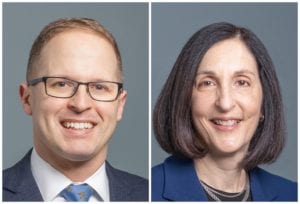Who is a member?
Our members are the local governments of Massachusetts and their elected and appointed leadership.

MMA President Adam Chapdelaine and Vice President Ruthanne Fuller
Having steered their own communities through a turbulent 2020, the MMA’s new president and vice president say they plan to help municipalities navigate another year of COVID-19, racial justice issues, and economic challenges during 2021.
Arlington Town Manager Adam Chapdelaine, who served as MMA vice president last year, became president on Jan. 22, succeeding Agawam City Councillor Cecilia Calabrese. Newton Mayor Ruthanne Fuller, who has been serving as the District 5 representative for the Massachusetts Mayors’ Association, replaced Chapdelaine as vice president.
Over the past year, Chapdelaine said, the MMA further solidified its role as the statewide voice for municipalities, giving local leaders opportunities to engage with state officials as they confronted myriad challenges related to the COVID-19 pandemic. He commended the MMA for also working with other organizations to ensure that cities and towns were being heard during crucial points in the pandemic.
“I am hopeful that we can take what we’ve learned in 2020 and apply it to the future in ways that can make our communities more engaged and more prepared for potential disruptions,” he said.
As president, Chapdelaine looks forward to collaborating with local leaders across the state as they work to ensure that residents are vaccinated and that communities adapt to the “new normal” that emerges post-pandemic. He said he will keep in mind the unique nature and needs of the municipalities, “while also knowing that we are all bonded together by our collective mission” to provide critical services, including public health and safety.
Chapdelaine has been Arlington’s town manager since 2012, and was previously the deputy manager there. He has also worked for the city of Fall River, the Greater New Bedford Workforce Investment Board, and for former Sen. Joan Menard. He earned a master’s degree in business administration from Suffolk University and a bachelor’s degree in political science from UMass Dartmouth.
First joining the MMA board in 2013, Chapdelaine has become progressively more involved in the organization and in the Massachusetts Municipal Management Association. He served as the president of the managers’ group in 2018.
In Arlington, Chapdelaine has increasingly engaged with issues of diversity, equity and inclusion. In recent years, the town has focused on intensive training of leaders and staff, and the hiring of a diversity coordinator. He said he hopes to play a leading role in advancing the MMA’s already-established commitment to racial justice and equity.
“I would like to work with the MMA Board of Directors, MMA staff, and member communities to provide a toolkit of best practices for how cities and towns can meaningfully and effectively engage on issues of race and equity,” Chapdelaine said. “My experience in starting this work in Arlington has allowed me to learn that creating a shared language and shared understanding of our nation’s history is critical to making real advances on these issues.”
Fuller became Newton’s first woman mayor in 2018. She also brings eight years of experience as a councillor. Before moving to Newton more than 25 years ago, Fuller lived in Brookline and served on its Finance Committee. She has more than two decades of experience as a strategic planner for nonprofits and businesses. She earned a bachelor’s degree in American history from Brown University, and a master’s degree in business administration from Harvard University.
“I look forward to linking arms with my fellow municipal leaders as we give voice to the needs of cities and towns and advocate for our residents at the State House and with the governor and lieutenant governor,” Fuller said.
Fuller said the MMA serves as the glue between municipalities and the state. She said the past year crystallized her understanding of the level of interdependence between state and local governments. She said the MMA plays an important role in helping local decision makers act together and learn from each other.
“Whether it is public health, economic strain, school reopening, police reform or racial equity, those bonds were strengthened this past year, and in the next few years will serve us well as we recover and rebound,” Fuller said.